2015-16学年配套中学教材全解九年级下英语(人教版)UNIT 9 I like mus
- 格式:doc
- 大小:108.00 KB
- 文档页数:10
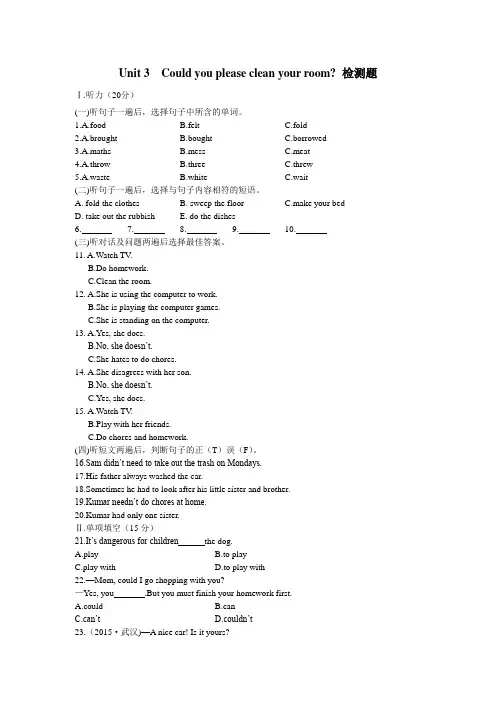
Unit 3 Could you please clean your room? 检测题Ⅰ.听力(20分)(一)听句子一遍后,选择句子中所含的单词。
1.A.food B.felt C.fold2.A.brought B.bought C.borrowed3.A.maths B.mess C.meat4.A.throw B.three C.threw5.A.waste B.white C.wait(二)听句子一遍后,选择与句子内容相符的短语。
A. fold the clothesB. sweep the floorC.make your bedD. take out the rubbishE. do the dishes6. 7. 8. 9. 10.(三)听对话及问题两遍后选择最佳答案。
11. A.Watch TV.B.Do homework.C.Clean the room.12. A.She is using the computer to work.B.She is playing the computer games.C.She is standing on the computer.13. A.Yes, she does.B.No, she doesn’t.C.She hates to do chores.14. A.She disagrees with her son.B.No, she doesn’t.C.Yes, she does.15. A.Watch TV.B.Play with her friends.C.Do chores and homework.(四)听短文两遍后,判断句子的正(T)误(F)。
16.Sam didn’t need to take out the trash on Mondays.17.His father always washed the car.18.Sometimes he had to look after his little sister and brother.19.Kumar needn’t do chores at home.20.Kumar had only one sister.Ⅱ.单项填空(15分)21.It’s dangerous for children the dog.A.playB.to playC.play withD.to play with22.—Mom, could I go shopping with you?—Yes, you .But you must finish your homework first.A.couldB.canC.can’tD.couldn’t23.(2015·武汉)—A nice car! Is it yours?—No, it isn’t. I it from a friend of mine two days ago.A.borrowB.have borrowedC.will borrowD.borrowed24.—Could I please your watch?—Sorry. It doesn’t work.eB.to useinged25.—Could you please take out the trash?—.A.Not at allB.You’re welcomeC.No wayD.No problem26.He didn’t finish the room.A.cleanB.cleanedC.cleaningD.cleans27.He is to finish the difficult work.A.enough confidentB.confident enoughC.enough confidenceD.confidence enough28.His father wants him in Beijing.A.to workB.worksC.workD.working29.Students have homework to do every day.A.so manyB.such manyC.such muchD.so much30.I never go to school late; .A.so does TomB.neither does TomC.so Tom doesD.neither Tom does31.(2015·山东潍坊)Next month we’re going somewhere interesting as soon as the holiday .A.will beginB.has begunC.beginsD.is beginning32.You could a bike from your friend.A.lendB.giveC.buyD.borrow33.Too much noise makes me uncomfortable.A.feelingB.feelC.feltD.to feel34.(2015·乌鲁木齐)—Where is Tom?—He is practicing English he can win the speech competition.A.to speak;in order toB.speaking;so thatC.speaking;in order toD.to speak;so that35.He doesn’t like playing cards; he thinks playing cards is a waste time.A.ofB.atC.forD.inⅢ.完形填空(15分)Tina and Tara are twin sisters. They look 36 , 37 they also have some differences.One day their grandfather came to see them with two gifts(礼物).When he came into the house, he saw Tina and 38 her a gift. After a while, when he got into the garden, he saw 39 granddaughter “Tara”.In fact that was Tina. When he gave the other gift to her, she said, “You gave me one just now.” “No, I gave a gift to your sister Tina.” “Oh, grandfather, I’m Tina.” Just then Tara came into the garden, 40 .“No w, grandfather, can you tell the differences 41 us?” “No, I can’t. Can you42 me?” “Yes, look. Tara is a little43 than me. Her hair is longer and curlier than 44 .Now, grandfather, can you see?” “Yes, now I can tell you from Tara. Tara, here is th e gift for you.” “Thank you45 your gift, grandfather.” With these words, they all laughed happily.36.A.same B.the same C.different D.differences37.A.and B.so C.but D.because38.A.gave B.took C.brought D.got39.A.others B.another C.the other D.the others40.A.either B.so C.also D.too41.A.as B.between C.from D.with42.A.tell B.say C.talk D.ask43.A.tall B.taller C.tallest D.the tallest44.A.I B.me C.my D.mine45.A.with B.of C.for D.toⅣ.任务型阅读(10分)Johnson lived in a certain part of London.Every morning,he woke up early and took an old bag to the subway station.He would take the subway to Central London.There he would collect scrap(废品).He did this every single day.Johnson collected scrap for 20 years.His house was dirty,and a bad smell came out of the house.The neighbors could not stand the smell anymore,so they called the police officers to deal with the problem.The officers opened the door and cleared the house.They found some money in his house.The police soon knew that Johnson was not a truly poor man because he could live a normal life with the money.They decided to try to stop him collecting scrap.In the evening,the police found Johnson near his house.One of the officers told him that there was no need for him to collect scrap anymore.Johnson went back to his house without saying anything.The next morning he woke up as usual and continued collecting scrap.A couple of days later,the police knew that Johnson had to send much money to his old parents.They were badly ill for many years in a small village.Although they could get relief (救济金) from the government,Johnson refused.He believed he could make money by his own hands.After knowing the truth,the officers announced the fact to the neighbors.All of them understood and admired Johnson.Johnson had no great plans or dreams all his life.He won praise from others because he kept independence in his mind.The earlier people learn to be independent,the more meaningful life they will get.根据短文内容,回答下列问题。
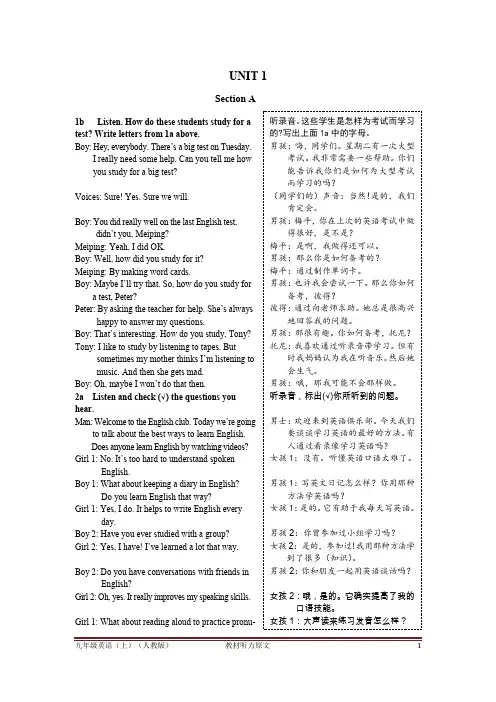
UNIT 1 Section A1b Listen. How do these students study for a test? Write letters from 1a above.Boy: Hey, everybody. There’s a big test on Tuesday.I really need some help. Can you tell me howyou study for a big test?Voices: Sure! Yes. Sure we will.Boy: You did really well on the last English test, didn’t you, Meiping?Meiping: Yeah, I did OK.Boy: Well, how did you study for it?Meiping: By making word cards.Boy: Maybe I’ll try that. So, how do you study fora test, Peter?Peter: By asking the teacher for help. She’s always happy to answer my questions.Boy: That’s interesting. How do you study, Tony? Tony: I like to study by listening to tapes. But sometimes my mother thinks I’m listening tomusic. And then she gets mad.Boy: Oh, maybe I won’t do that then.2a Listen and check (√) the questions you hear.Man: Welcome to the English club. Today we’re going to talk about the best ways to learn English.Does anyone learn English by watching videos? Girl 1: No. It’s too hard to understand spokenEnglish.Boy 1: What about keeping a diary in English?Do you learn English that way?Girl 1: Yes, I do. It helps to write English every day.Boy 2: Have you ever studied with a group?Girl 2: Yes, I have! I’ve learned a lot that way.Boy 2: Do you have conversations with friends in English?Girl 2: Oh, yes. It really improves my speaking skills. Girl 1: What about reading aloud to practice pronu- 听录音。
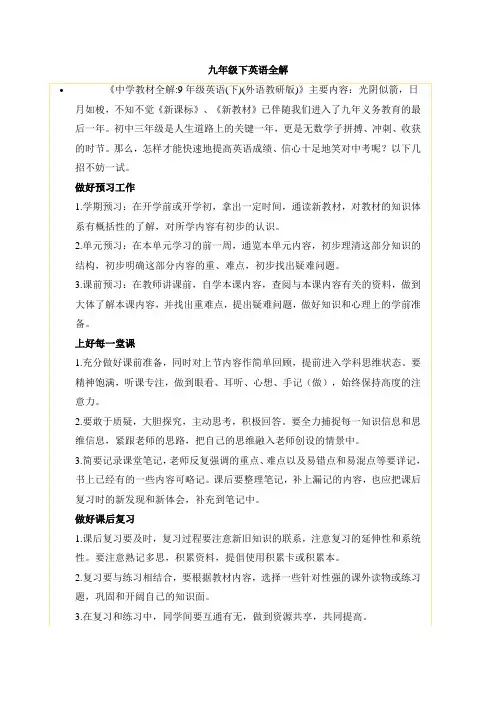
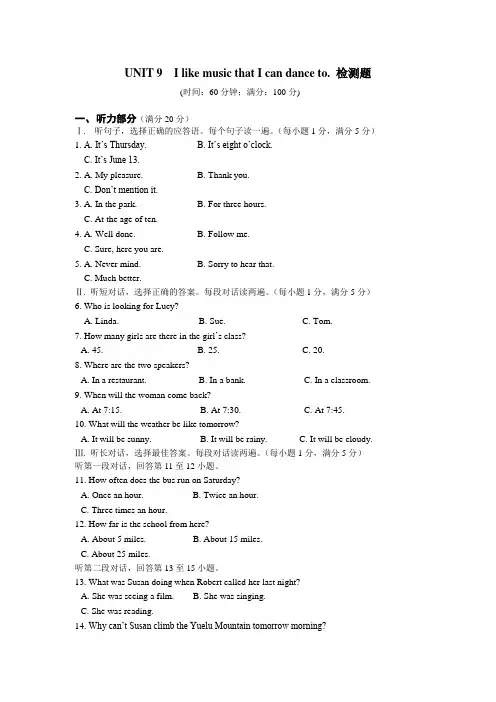
UNIT 9 I like music that I can dance to. 检测题(时间:60分钟;满分:100分)一、听力部分(满分20分)Ⅰ. 听句子,选择正确的应答语。
每个句子读一遍。
(每小题1分,满分5分)1. A. It’s Thursday. B. It’s eight o’clock.C. It’s June 13.2. A. My pleasure. B. Thank you.C. Don’t mention it.3. A. In the park. B. For three hours.C. At the age of ten.4. A. Well done. B. Follow me.C. Sure, here you are.5. A. Never mind. B. Sorry to hear that.C. Much better.Ⅱ. 听短对话,选择正确的答案。
每段对话读两遍。
(每小题1分,满分5分)6. Who is looking for Lucy?A. Linda.B. Sue.C. Tom.7. How many girls are there in the girl’s class?A. 45.B. 25.C. 20.8. Where are the two speakers?A. In a restaurant.B. In a bank.C. In a classroom.9. When will the woman come back?A. At 7:15.B. At 7:30.C. At 7:45.10. What will the weather be like tomorrow?A. It will be sunny.B. It will be rainy.C. It will be cloudy. Ⅲ. 听长对话,选择最佳答案。
每段对话读两遍。
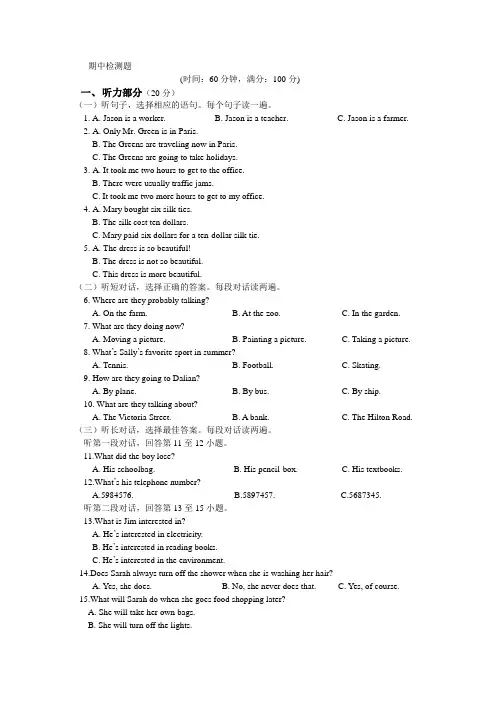
期中检测题(时间:60分钟,满分:100分)一、听力部分(20分)(一)听句子,选择相应的语句。
每个句子读一遍。
1. A. Jason is a worker. B. Jason is a teacher. C. Jason is a farmer.2. A. Only Mr. Green is in Paris.B. The Greens are traveling now in Paris.C. The Greens are going to take holidays.3. A. It took me two hours to get to the office.B. There were usually traffic jams.C. It took me two more hours to get to my office.4. A. Mary bought six silk ties.B. The silk cost ten dollars.C. Mary paid six dollars for a ten-dollar silk tie.5. A. The dress is so beautiful!B. The dress is not so beautiful.C. This dress is more beautiful.(二)听短对话,选择正确的答案。
每段对话读两遍。
6. Where are they probably talking?A. On the farm.B. At the zoo.C. In the garden.7. What are they doing now?A. Moving a picture.B. Painting a picture.C. Taking a picture.8. What’s Sally’s favorite sport in summer?A. Tennis.B. Football.C. Skating.9. How are they going to Dalian?A. By plane.B. By bus.C. By ship.10. What are they talking about?A. The Victoria Street.B. A bank .C. The Hilton Road. (三)听长对话,选择最佳答案。
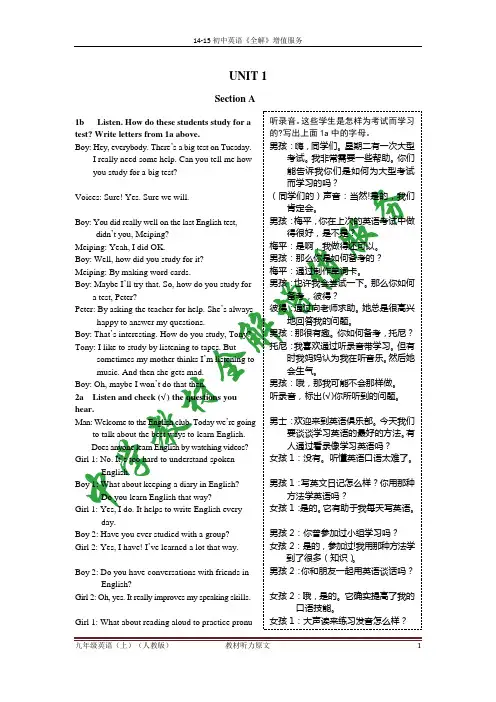
UNIT 1 Section APaul: Maybe I’ll go. The only other problem is that I don’t get much writing practice.Ms. Manson: Maybe you should find a pen pal. Paul: That sounds like a fun way to practice writing.Thanks, Ms. Manson.UNIT 2Section A1b Listen and T for true or F for false. Mary: What a great day!Bill: Yes, it was really fun!Mary: What did you like best?Bill: I loved the races! They were really interesting to watch. How fantastic the dragon boat teamswere!Mary: Yes! And look at the colors of the boats.How pretty they were!Bill: I agree! But I guess it was a little too crowded. Mary: I don’t know…I kind of like to have more people around. It makes things more exciting. Bill: That’s true. Oh, and I really liked eating zongzi. Mary: Oh, me too! The sweet ones are my favorite.Bill: I wonder if they’ll have the races again next year.Mary: Of course! They have them every year. Bill: Then I believe that I’ll be back again next year to watch the races!Mary: Me, too!2a Listen to the conversation between Wu Ming and Harry and the correct words in the sentences.Harry: What did you do on your vacation, Wu Ming? Wu Ming: I visited my aunt and uncle in Hong Kong.Harry: Wow! So what did you do?Wu Ming: Well, we ate out a lot. I believe that we ate at least five meals a day! How delicious thefood is! I’ve put on five pounds!Harry: Haha! Yes, the food in Hong Kong is delicious.What else did you do?Wu Ming: Shopping, of course. Hong Kong is a great place for shopping! I spent so much money. 保罗:也许我会去。
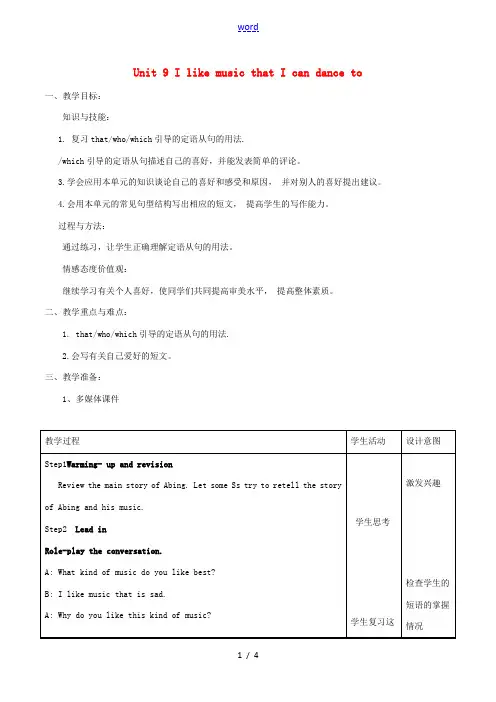
Unit 9 I like music that I can dance to 一、教学目标:
知识与技能:
1. 复习that/who/which引导的定语从句的用法.
/which引导的定语从句描述自己的喜好,并能发表简单的评论。
3.学会应用本单元的知识谈论自己的喜好和感受和原因,并对别人的喜好提出建议。
4.会用本单元的常见句型结构写出相应的短文,提高学生的写作能力。
过程与方法:
通过练习,让学生正确理解定语从句的用法。
情感态度价值观:
继续学习有关个人喜好,使同学们共同提高审美水平,提高整体素质。
二、教学重点与难点:
1. that/who/which引导的定语从句的用法.
2.会写有关自己爱好的短文。
三、教学准备:
1、多媒体课件
板书设计
Unit 9 I like music that I can dance to.
1. I like movie stars who/that are beautiful or handsome.
2. I have friends who/that are friendly and helpful.
3. I enjoy spending time in places that/which are relaxing.。
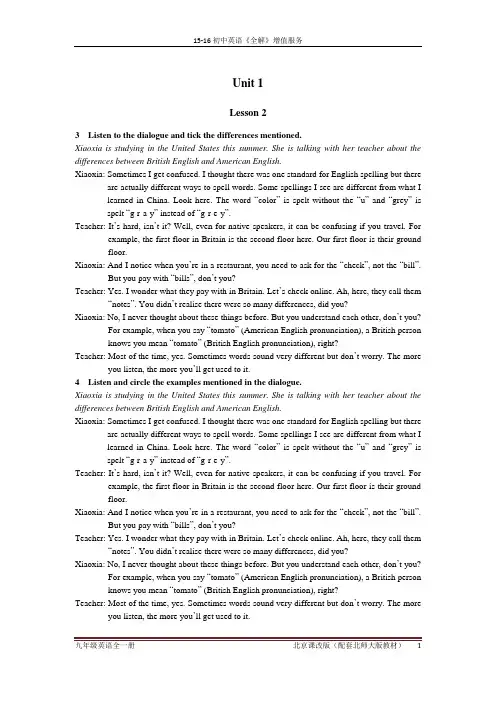
Unit 1Lesson 23Listen to the dialogue and tick the differences mentioned.Xiaoxia is studying in the United States this summer. She is talking with her teacher about the differences between British English and American English.Xiaoxia: Sometimes I get confused. I thought there was one standard for English spelling but there are actually different ways to spell words. Some spellings I see are different from what I learned in China. Look here. The word “color”is spelt without the “u”and “grey”is spelt “g-r-a-y” instead of “g-r-e-y”.Teacher: It’s hard, isn’t it? Well, even for native speakers, it can be confusing if you travel. For example, the first floor in Britain is the second floor here. Our first floor is their ground floor.Xiaoxia: And I notice when you’re in a restaurant, you need to ask for the “check”, not the “bill”.But you pay with “bills”, don’t you?Teacher: Yes. I wonder what they pay with in Britain. Let’s check online. Ah, here, they call them “notes”. You didn’t realise there were so many differences, did you?Xiaoxia: No, I never thought about these things before. But you understand each other, don’t you?For example, when you say “tomato” (American English pronunciation), a British person knows you mean “tomato” (British English pronunciation), right?Teacher: Most of the time, yes. Sometimes words sound very different but don’t worry. The more you listen, the more you’ll get used to it.4Listen and circle the examples mentioned in the dialogue.Xiaoxia is studying in the United States this summer. She is talking with her teacher about the differences between British English and American English.Xiaoxia: Sometimes I get confused. I thought there was one standard for English spelling but there are actually different ways to spell words. Some spellings I see are different from what I learned in China. Look here. The word “color”is spelt without the “u”and “grey”is spelt “g-r-a-y” instead of “g-r-e-y”.Teacher: It’s hard, isn’t it? Well, even for native speakers, it can be confusing if you travel. For example, the first floor in Britain is the second floor here. Our first floor is their ground floor.Xiaoxia: And I notice when you’re in a restaurant, you need to ask for the “check”, not the “bill”.But you pay with “bills”, don’t you?Teacher: Yes. I wonder what they pay with in Britain. Let’s check online. Ah, here, they call them “notes”. You didn’t realise there were so many differences, did you?Xiaoxia: No, I never thought about these things before. But you understand each other, don’t you?For example, when you say “tomato” (American English pronunciation), a British person knows you mean “tomato” (British English pronunciation), right?Teacher: Most of the time, yes. Sometimes words sound very different but don’t worry. The more you listen, the more you’ll get used to it.5Listen again and write the examples in the correct box below.Xiaoxia is studying in the United States this summer. She is talking with her teacher about the differences between British English and American English.Xiaoxia: Sometimes I get confused. I thought there was one standard for English spelling but there are actually different ways to spell words. Some spellings I see are different from what I learned in China. Look here. The word “color”is spelt without the “u”and “grey”is spelt “g-r-a-y” instead of “g-r-e-y”.Teacher: It’s hard, isn’t it? Well, even for native speakers, it can be confusing if you travel. For example, the first floor in Britain is the second floor here. Our first floor is their ground floor.Xiaoxia: And I notice when you’re in a restaurant, you need to ask for the “check”, not the “bill”.But you pay with “bills”, don’t you?Teacher: Yes. I wonder what they pay with in Britain. Let’s check online. Ah, here, they call them “notes”. You didn’t realise there were so many differences, did you?Xiaoxia: No, I never thought about these things before. But you understand each other, don’t you?For example, when you say “tomato” (American English pronunciation), a British person knows you mean “tomato” (British English pronunciation), right?Teacher: Most of the time, yes. Sometimes words sound very different but don’t worry. The more you listen, the more you’ll get used to it.Unit 2Lesson 53Listen to the interview. Tick the quotations that are mentioned.Host: Hello everyone. I’m your host David Newton and welcome to “The Book Club”. Today we’re going to discuss how important reading is. Our guests today are well-known writer Sandra White and English teacher Dr Peter Johnson. Welcome to the show.Sandra: Thank you. It’s great to be here.Peter: Thanks.Host: I remember the famous American writer Mark Twain once said, “The man who doesn’t read good books has no advantage over the man who can’t read them.”What do you think, Peter? Peter: That’s true. Twain was a very wise man. I think we forget that there was a time when fewer people knew how to read and write. Now reading is something everyone does. There’s a world of wonderful books out there—old books, new books, e-books—it doesn’t matter.They can all help people learn.Sandra: Well, not all books help people learn. Good books do.Host: So, Susan. How do we know if we’re reading a good book or not? What is a good book? Sandra: Well, it depends on what you’re looking for, but one thing is clear: good books are inspiring. A lot of famous people who achieved great things were inspired by a certain book during a key period in their life—usually when they were young.Peter: Right. I remember the famous British science fiction writer Arthur C. Clarke once said, “I’m rather proud of the fact that I know several astronauts who became astronauts through reading my books.”Host: That’s very interesting! And…4Listen to the interview again and answer the questions.Host: Hello everyone. I’m your host David Newton and welcome to “The Book Club”. Today we’re going to discuss how important reading is. Our guests today are well-known writer Sandra White and English teacher Dr Peter Johnson. Welcome to the show.Sandra: Thank you. It’s great to be here.Peter: Thanks.Host: I remember the famous American writer Mark Twain once said, “The man who doesn’t read good books has no advantage over the man who can’t read them.”What do you think, Peter? Peter: That’s true. Twain was a very wise man. I think we forget that there was a time when fewer people knew how to read and write. Now reading is something everyone does. There’s a world of wonderful books out there—old books, new books, e-books—it doesn’t matter.They can all help people learn.Sandra: Well, not all books help people learn. Good books do.Host: So, Susan. How do we know if we’re reading a good book or not? What is a good book? Sandra: Well, it depends on what you’re looking for, but one thing is clear: good books are inspiring. A lot of famous people who achieved great things were inspired by a certain book during a key period in their life—usually when they were young.Peter: Right. I remember the famous British science fiction writer Arthur C. Clarke once said, “I’m rather proud of the fact that I know several astronauts who became astronauts through reading my books.”Host: That’s very interesting! And…5Listen again and choose the best answer.Host: Hello everyone. I’m your host David Newton and welcome to “The Book Club”. Today we’re going to discuss how important reading is. Our guests today are well-known writer Sandra White and English teacher Dr Peter Johnson. Welcome to the show.Sandra: Thank you. It’s great to be here.Peter: Thanks.Host: I remember the famous American writer Mark Twain once said, “The man who doesn’t read good books has no advantage over the man who can’t read them.”What do you think, Peter? Peter: That’s true. Twain was a very wise man. I think we forget that there was a time when fewer people knew how to read and write. Now reading is something everyone does. There’s a world of wonderful books out there—old books, new books, e-books—it doesn’t matter.They can all help people learn.Sandra: Well, not all books help people learn. Good books do.Host: So, Susan. How do we know if we’re reading a good book or not? What is a good book? Sandra: Well, it depends on what you’re looking for, but one thing is clear: good books are inspiring. A lot of famous people who achieved great things were inspired by a certain book during a key period in their life—usually when they were young.Peter: Right. I remember the famous British science fiction writer Arthur C. Clarke once said, “I’m rather proud of the fact that I know several astronauts who became astronauts through reading my books.”Host: That’s very interesting! And…Unit 3Lesson 82Listen to the debate. What is Andrew’s opinion? What is Jenny’s opinion?Teacher: OK, everyone. Today Andrew and Jenny are going to have a short debate about inventions. Andrew, let’s start with you.Andrew: Thank you, Mr Collins. I support the position that scientists need to quickly increase the number of new inventions. Inventions help us live better and longer. Think about all the inventions that save lives like X-rays and machines to start hearts when they stop. I believe we’ll benefit more from new inventions in the future.Teacher: Jenny, your response?Jenny: I don’t agree. In my opinion, scientists should cut down on the number of new inventions.Technology isn’t a bad thing and we do need new inventions, but having more inventions may not be a good thing. Some inventions bring serious problems, for example, nuclear power.Andrew: But nuclear power provides us with cheap energy.Jenny: Cheap but not safe! Lots of people are thinking about its safety. There have been dangerous accidents in Japan recently.Andrew: I disagree. What about cars? There’s some danger involved too. Should we not use them just because car accidents happen every day? Cars make our life easier, don’t you agree? Jenny: I don’t think so. Just look at traffic jams. We waste so much time on the road because there are too many cars. Moreover, all those cars make the air very polluted.Andrew: And this is why we need more new inventions—to deal with problems like air pollution.I know some new cars are good for our environment. I believe they will help to solvesome of the pollution problems.Teacher: All right class. Let’s discuss this together. Who do you agree with?3Listen again and write A for Andrew or J for Jenny in the boxes.Teacher: OK, everyone. Today Andrew and Jenny are going to have a short debate about inventions. Andrew, let’s start with you.Andrew: Thank you, Mr Collins. I support the position that scientists need to quickly increase the number of new inventions. Inventions help us live better and longer. Think about all the inventions that save lives like X-rays and machines to start hearts when they stop. I believe we’ll benefit more from new inventions in the future.Teacher: Jenny, your response?Jenny: I don’t agree. In my opinion, scientists should cut down on the number of new inventions.Technology isn’t a bad thing and we do need new inventions, but having more inventions may not be a good thing. Some inventions bring serious problems, for example, nuclear power.Andrew: But nuclear power provides us with cheap energy.Jenny: Cheap but not safe! Lots of people are thinking about its safety. There have been dangerous accidents in Japan recently.Andrew: I disagree. What about cars? There’s some danger involved too. Should we not use themjust because car accidents happen every day? Cars make our life easier, don’t you agree? Jenny: I don’t think so. Just look at traffic jams. We waste so much time on the road because there are too many cars. Moreover, all those cars make the air very polluted.Andrew: And this is why we need more new inventions—to deal with problems like air pollution.I know some new cars are good for our environment. I believe they will help to solvesome of the pollution problems.Teacher: All right class. Let’s discuss this together. Who do you agree with?4Listen again. Are these sentences true or false?Teacher: OK, everyone. Today Andrew and Jenny are going to have a short debate about inventions. Andrew, let’s start with you.Andrew: Thank you, Mr Collins. I support the position that scientists need to quickly increase the number of new inventions. Inventions help us live better and longer. Think about all the inventions that save lives like X-rays and machines to start hearts when they stop. I believe we’ll benefit more from new inventions in the future.Teacher: Jenny, your response?Jenny: I don’t agree. In my opinion, scientists should cut down on the number of new inventions.Technology isn’t a bad thing and we do need new inventions, but having more inventions may not be a good thing. Some inventions bring serious problems, for example, nuclear power.Andrew: But nuclear power provides us with cheap energy.Jenny: Cheap but not safe! Lots of people are thinking about its safety. There have been dangerous accidents in Japan recently.Andrew: I disagree. What about cars? There’s some danger involved too. Should we not use them just because car accidents happen every day? Cars make our life easier, don’t you agree? Jenny: I don’t think so. Just look at traffic jams. We waste so much time on the road because there are too many cars. Moreover, all those cars make the air very polluted.Andrew: And this is why we need more new inventions—to deal with problems like air pollution.I know some new cars are good for our environment. I believe they will help to solvesome of the pollution problems.Teacher: All right class. Let’s discuss this together. Who do you agree with?Unit 4Lesson 112Listen to the radio programme. Tick the things mentioned.Host: Hello listeners. Welcome to Science This Week. We all know China’s space programme has achieved a lot. To help us learn more, a scientist from China’s space programme is joining us from her Beijing office. Dr Wang, thank you for talking with us.Dr Wang: My pleasure.Host: Can you briefly talk about the history of China’s space programme?Dr Wang: Sure. China’s space programme began in 1956. We launched our first satellite, Dongfanghong 1, in 1970. Space flight started with the launch of Shenzhou 1. Host: Can you tell us something about the Shenzhou spacecraft?Dr Wang: Shenzhou 1 was China’s first unmanned flight. It was launched in 1999. Three more launches followed. The manned launches of Shenzhou 5, 6, and 7 happened in 2003,2005 and 2008. And in 2012, the first female Chinese astronaut went into space onShenzhou 9.Host: So, China’s first astronaut was sent into space on Shenzhou 5?Dr Wang: Yes, that was in 2003. It carried the first Chinese astronaut, Yang Liwei into space. Host: I’ve heard another famous name, Tiangong 1. Can you tell us something about it?Dr Wang: It was another great achievement in 2011 that showed China’s ability to build space stations.Host: Wow! China’s space technology has advanced quickly in less than sixty years.Dr Wang: Yes. Even though China’s space programme started nearly fifty years later than the America’s, Chinese scientists have put a lot of effort into the programme and havenever given up. Without the hard work of all the great scientists in the programme, wewould never have succeeded.Host: Dr Wang, thank you for your time today.Dr Wang: You’re welcome.3Read the Listening Help. Then listen and fill in the timeline.Host: Hello listeners. Welcome to Science This Week. We all know China’s space programme has achieved a lot. To help us learn more, a scientist from China’s space programme is joining us from her Beijing office. Dr Wang, thank you for talking with us.Dr Wang: My pleasure.Host: Can you briefly talk about the history of China’s space programme?Dr Wang: Sure. China’s space programme began in 1956. We launched our first satellite, Dongfanghong 1, in 1970. Space flight started with the launch of Shenzhou 1. Host: Can you tell us something about the Shenzhou spacecraft?Dr Wang: Shenzhou 1 was China’s first unmanned flight. It was launched in 1999. Three more launches followed. The manned launches of Shenzhou 5, 6, and 7 happened in 2003,2005 and 2008. And in 2012, the first female Chinese astronaut went into space onShenzhou 9.Host: So, China’s first astronaut was sent into space on Shenzhou 5?Dr Wang: Yes, that was in 2003. It carried the first Chinese astronaut, Yang Liwei into space. Host: I’ve heard another famous name, Tiangong 1. Can you tell us something about it?Dr Wang: It was another great achievement in 2011 that showed China’s ability to build space stations.Host: Wow! China’s space technology has advanced quickly in less than sixty years.Dr Wang: Yes. Even though China’s space programme started nearly fifty years later than the America’s, Chinese scientists have put a lot of effort into the programme and havenever given up. Without the hard work of all the great scientists in the programme, wewould never have succeeded.Host: Dr Wang, thank you for your time today.Dr Wang: You’re welcome.4Listen again and circle the correct answers.Host: Hello listeners. Welcome to Science This Week. We all know China’s space programme has achieved a lot. To help us learn more, a scientist from China’s space programme is joiningus from her Beijing office. Dr Wang, thank you for talking with us.Dr Wang: My pleasure.Host: Can you briefly talk about the history of China’s space programme?Dr Wang: Sure. China’s space programme began in 1956. We launched our first satellite, Dongfanghong 1, in 1970. Space flight started with the launch of Shenzhou 1. Host: Can you tell us something about the Shenzhou spacecraft?Dr Wang: Shenzhou 1 was China’s first unmanned flight. It was launched in 1999. Three more launches followed. The manned launches of Shenzhou 5, 6, and 7 happened in 2003,2005 and 2008. And in 2012, the first female Chinese astronaut went into space onShenzhou 9.Host: So, China’s first astronaut was sent into space on Shenzhou 5?Dr Wang: Yes, that was in 2003. It carried the first Chinese astronaut, Yang Liwei into space. Host: I’ve heard another famous name, Tiangong 1. Can you tell us something about it?Dr Wang: It was another great achievement in 2011 that showed China’s ability to build space stations.Host: Wow! China’s space technology has advanced quickly in less than sixty years.Dr Wang: Yes. Even though China’s space programme started nearly fifty years later than the America’s, Chinese scientists have put a lot of effort into the programme and havenever given up. Without the hard work of all the great scientists in the programme, wewould never have succeeded.Host: Dr Wang, thank you for your time today.Dr Wang: You’re welcome.期中测试题一、听对话,从下面各题所给的A、B、C三幅图片中选择与对话内容相符的图片。
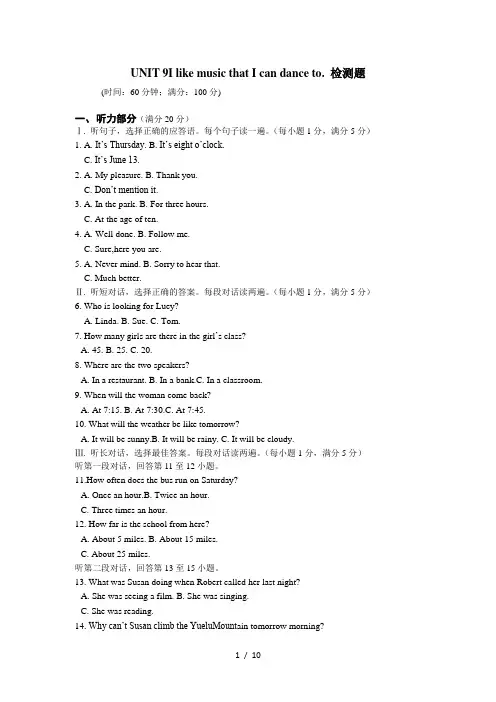
UNIT 9I like music that I can dance to. 检测题(时间:60分钟;满分:100分)一、听力部分(满分20分)Ⅰ. 听句子,选择正确的应答语。
每个句子读一遍。
(每小题1分,满分5分)1. A. It’s Thursday. B. It’s eight o’clock.C. It’s June 13.2. A. My pleasure. B. Thank you.C. Don’t mention it.3. A. In the park. B. For three hours.C. At the age of ten.4. A. Well done. B. Follow me.C. Sure,here you are.5. A. Never mind. B. Sorry to hear that.C. Much better.Ⅱ. 听短对话,选择正确的答案。
每段对话读两遍。
(每小题1分,满分5分)6. Who is looking for Lucy?A. Linda.B. Sue.C. Tom.7. How many girls are there in the girl’s class?A. 45.B. 25.C. 20.8. Where are the two speakers?A. In a restaurant.B. In a bank.C. In a classroom.9. When will the woman come back?A. At 7:15.B. At 7:30.C. At 7:45.10. What will the weather be like tomorrow?A. It will be sunny.B. It will be rainy.C. It will be cloudy.Ⅲ. 听长对话,选择最佳答案。
每段对话读两遍。
(每小题1分,满分5分)听第一段对话,回答第11至12小题。
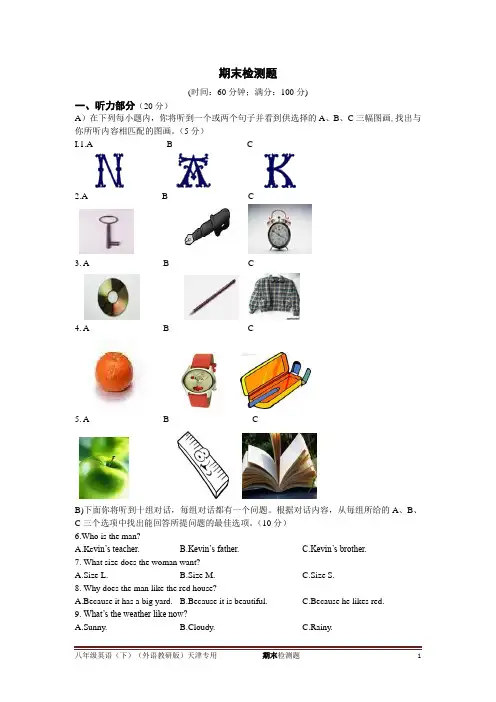
期末检测题(时间:60分钟;满分:100分)一、听力部分(20分)A)在下列每小题内,你将听到一个或两个句子并看到供选择的A、B、C三幅图画。找出与你所听内容相匹配的图画。
(5分)I.1.A B C2.A B C3. A B C4. A B C5. A B CB)下面你将听到十组对话,每组对话都有一个问题。
根据对话内容,从每组所给的A、B、C三个选项中找出能回答所提问题的最佳选项。
(10分)6.Who is the man?A.Ke vin’s teacher.B.Kevin’s father.C.Kevin’s brother.7. What size does the woman want?A.Size L.B.Size M.C.Size S.8. Why does the man like the red house?A.Because it has a big yard.B.Because it is beautiful.C.Because he likes red.9. What’s the weather like now?A.Sunny.B.Cloudy.C.Rainy.10. Where is the City Library?A.Next to a bookstore.B.At the second crossing.C.Along the street.11. How old is the girl?A.13.B.12.C.11.12. How will they go to the park?A.By bike.B.On foot.C.By car.13. When does the museum open on Sunday?A.At 9 am.B.At 10 am.C.At 11 am.14. Where does the woman want to go?A.To a party.B.To the theater.C.To the cinema.15. What’s the boy’s plan for his holiday?A.To go travelling with his classmates.B.To go travelling with his uncle.C.To go to his uncle’s.C)你将听到两段对话,在每段对话后有几个小题。
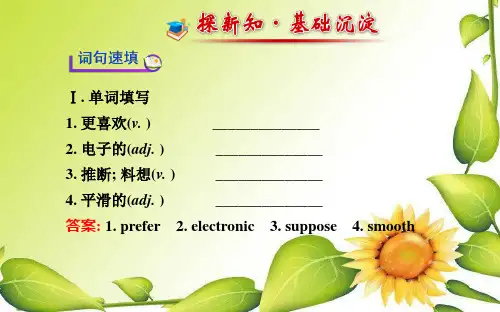
山东省人教版九年级下册英语(新目标)配套练习册答案Unit 9 when was it invented ?Section A一: 1.invented 2.invention 3.adjustable 4.heat 5.slippers 二: 1~5 C BCCC三: 1. What, used for 2. Who , invented 3. is , cleaned 4.must be repaired 5. to seeSection B一: 1.notice 2. salty 3.produced 4. remain 5.pleasant二: 2.too thin 2.by accident 3.According to, was discovered 4. by mistake 5.in this way ,in the end 6.fell into三: 1~5:AADCD 6~10:BDBDC 11~12 :AC四: for, on, Who , think, are, inwentions, is , mostSelf Check and Reading一: 1.century 2.knock 3.below 4.wooden 5.towards 6.developing 7.divided 8.active 9.aim 10.create二: 1.helpful 2.invention 3.salt 4.the most popular5.safety6.wood三: 1.It is believed d 3. to learn 4.was sent 5.was handed in 6.Was ,cleaned 7.found him 8.When was, invented四: 1~5:BADBA 6~10:CADAB五: 1~5:ABCAC6.He grew vegetables in his garden and sold them.With the money he set up a chemical lab.7.Yes.Because he was awarded 1368 separate and distinct patents during his lifetime.8.February 11th,1847 9.October 18th ,1931 10.America 11.Builta lab 12. 136813. His first patented invention was an electrical vote recorder in 1868.14. 1876~1877,invented the phonograph.15.1900~1910, invented and perfected and steel alkaline storage battery.Unit10 By the time I got outside ,the bus had already leftSection A一: 1.lock 2.verslept 3.rush 4.relative 5.broke二: 1. had left 2.had left 3.to come 4.had cooked 5.doesn’t rain 6.had had 7. finishing 8.had learnt三: 1~5:CBBAB四: 1.walking, on time 2.been late for ,came ,close 3.gooff ,overslept 4.broke down 5.ran offSection B一 : 1.exhausted 2.costume 3.ending 4.thrilled 5.empty 6.revea l 7.panic 8.describe 9.fooled 10.married二: 1~5CABBD 6~10BAACD三: 1.set off 2.get married 3.invited ,to watch 4.showed up 5.as much ,as 6.stay up 7.happened to 8.Hundreds of 9.so ,that四: 1~5:BEDCASelf Check and Reading一: 1.met,hadn’t seen 2.crying 3.to go 4.havelearnt/learned 5.will be showed /shown二: 1.too,to 2.as much as possible 3.had seen 4.has he 5.weren’t allowed三: 1~5 CBCCD 6~10 BABDC四: 1~5 TFFTF 6~10 CDBACUnit 11 could you please tell me where the restrooms are?Section A一: 1.shampoo 2.fresh 3.restrooms 4.department 5.escalator二: 1.in the middle of 2.across from 3. In frontof 4.between 5.past三: 1~6 CBCDCD四: 1.to get to 2.if/whether thereis 3.when,leaves 4.where,is 5.to talk,they went 6.Take ,to ,Go past ,next t to五: Excuse me , Sure, second , How , escalator/elevator, turn , past , between , andSection B一: 1.slides anized 3.dresses 4.cheap/inexpensive 5.uncrowded二: 1~5 BCDAB 6~10 DCCBD三: 1.where there is 2.if /whether there are 3,shall we 4.notget 5.took , to mendSelf check and reading一: 1.lend 2.park 3.trouble 4.wonder 5,hand二: 1~5 CACBB 6~10 BDBAC三: 1.lend ,to 2.where ,is 3.spend on /buying 4.if/whether , goes 5.Could you tell me how I can get to the library? 6.ask for information politely 7.What ,sounds 8.Speaking ,enough 9.too many, depend on 10.talking, chang ,speak四: 1~5 CACCD 6~10 ADBCA五: 1~5TTFFF 6.They will die 7.On his farm 8.600 mils(away) 9.Two weeks 10.Yes,they didUnit 12 You’are supposed to shake hands .Section A一: 1.bow 2.shake 3.relaxed 4.customs 5.greet二: 1~5:BBADB三: 1.to bring ,left 2.have asked 3.relaxed 4.Spending 5.tobe 6.calling 7.to do四: 1.Are you supposed , Yes ,are 2.are supposed to greet 3.What are ,supposed to do 4.don’t, have 5.are supposed to bow 6.supposed to arrive ,arrived 7.have asked ,were supposed 8.make plans toSection B一: 1.forks 2.wipe,napkin 3.noise 4.full 5.point二: 1.inviting 2.am having 3.study 4.get ,getting 5.to say三: 1~5 BACBC 6~10 BAABD四: 1.pick up 2.rude ,stick ,into 3.out of ,make ,feel 4.it difficult to 5.to be ,to doing五: nervous, use, behave ,manners ,good/great /nice ,polite ,supposed ,rules , point, walkingSelf check and reading一:1.unfamiliar 2.knife ,spoon 3.experiment 4.beside 5.Whose二: 1.way ,to save /for saving 2.seem,familiarto 3.alone ,bored 4.couldn’t help laughing 5.easier ,faster ,working三: 1~5BADBB四: 1~5DBDBD 6~10DBCAD五: 1~5BBBDC 6~10FFTFT六: 1.hardly 2.lost 3.right 4.show fortable 6.towards 7. matter 8.other 9.called 10.healthyUnit 13 Rainy days make me sad .Saction A一: 1.design 2.hard 3.served 4.pink 5.fair 6.uncomfortable 7. poiiution 8.scientific 9.stressed 10.owners 11.waiting 12.made 13.work 14.playing 15.walk二: 1~5BCAAD 6~10 BCBBB三: 1.takes them,to do 2.doesn’t make 3.Whatdoes ,make ,feel 4.so,that 5.What ,think四: 1~5 ECDABSection B一: 1.shiny 2.truth 3.products 4.tastes 5.led 6.(to)compare 7 .annoyed 8.keep out 9.schoolbag 10.designed二: 1~5 ADCCA 6~8 BDB三:1.working well 2.annoyed withmyself 3.confusing ,misleading 4.For instance /For example5.the quality of the productSelf check and reading一: 1.schoolbag 2.purple 3.purses/wallets 4.taste 5.thought二: 1.To be honest ,kind 2.not to see 3.felt embarrassed 4.has been on 5.decided to四:1~5 CAAAD6.The father was really sad ,shutting himself away from his friends and refusing to do any activity.7.So8.Because he hoped his daughter’s candle would no longer be put out by his useless tears.9.亲爱的,为什么只有你的蜡烛不点燃(不燃烧)呢?10.The father was no longer sad.Unit 14 have you packed yet.Sction A一: 1.farm 2.water 3.wood 4.towel 5.light二: 1.Have,finished, finished 2.haven’t heard 3.hasworked 4.been 5.have been 6.lent ,hasn’t 7.Have ,bougt 8.have lost 9.have taken 10.to lock三: 1~5BCBBC 6~10 ADBCA四: 1.haven’t stadyed 2.has taught 3.Has ,done ,yet 4.Howofen 5.doesn’t have五:1~5 EDCBASection B一: 1.appear 2.award 3.scene 4.poems 5.chop二: 1.be sure 2.some day 3.say goodbye to 4.been on ed to三: 1~5 BBDAB四: 1.Have you bought a street map?2.I haven’t cleaned out the refrigerator yet.3.I have so many chores to do today.4.They’ve been on TV lots of times.5.Have you got the mail from the mail box?五:1.have been 2.is 3.snowed 4.will have 5.to believe 6.havegot 7.came 8.will send 9.will like eSelf check and reading一: 1.strongly 2.Southern ernment 4.purpose 5.step二:1.eating 2.hardly 3.roots anized 5.experiencing三: 1.Thinks to 2.looking forward to learning 3.do the/their daily activities 4.have never been 5.where your ancestors lived四: 1~5 CADBB 6~10CDABD五: 1~5ABCAB 6~9ACCUnit 15 We’re trying to save the manatees !Section A一: 1.aggressive 2.gentle 3.weigh 4.faster 5.playful 6.feet 7 .polluted 8.her 9.surprised 10.stronger 11.believes 12.tobe 13.was found 14.living 15.provides二: 1~5CBACD 6~10 CCBBB三: 1.care for ,because 2.a suitable place for 3.to smoke in public 4.surprised to find hardly ,arrived at /got to 5.trying to save endangeredSction B一: 1.planet 2.society 3.spare/free 4.built 5.model二: 1.stop 2.Recycling,toprotect 3.agree 4.putting 5.riding ,riding/to ride三: 1~5BDBAD 6~7BA四: 1.Have ,heard of ,the best player 2.is only used for 3.raising money for 4.disagree with 5.was built out of五: 1~5 FGBECSelf check and reading一: cate 2.against 3.save 4.supposed 5.award 6.endangered 7.recycle 8.Underwater 9.living 10.spare二: 1.You’d better turn off 2.feel about , won/got 3.need our support 4.fifty kilometers long ,thirty meters wide 5.Is ,anyone else 6.suitable for teaching 7.so /as clean as ,used to be 8.hardly move 9.agree with ,I side 10.take care of ,care for三: 1~5DCBDD 6~10 CBABA四: 1~5 BCBCD五: 1.to play 2.are 3.building 4.find 5.seems 6.cutting 7.be made 8.fell 9.to do 10.have written期中综合练习一: 1.ancient 2.century 3.towards 4.lock 5.broke 6.oversleep 7.park 8.lent 9.greeted 10.relaxed 11.discovery 12.invention 1 3.really 14.exhausted 15.Hundreds 16.the mostpopular 17.unfamiliar 18.different 19.interested,interesting 20. heroes 21.had gone 22.is spoken 23.toshake ed,cutting 25.goes 26.invented 27.hadbeen 28.seeing 29.to come 30.was designed二: 1~5BBDAB 6~10DADCC 11~15BBCAA 16~20BCBAA三: 1.is,used 2.have sent 3.What was it used for 4.a ride 5.such a clever ,liked him 6.How many times 7.if you will go 8.when he should go 9.said to ,Are you afraid of 10.are supposed to四:1.old enough 2.According to what 3.dreams /dreamedof becoming ,like 4.overslept ,go off 5.nothing bad ,happen to 6.By the time ,had learned /learnt 7.got married ,much furniture 8.where the escalator is ed to getting up 10.went out of his way五: 1~5 EBAFD六: 1~5ADABD 6~10ABBCA七: 1~5DCCDA 6~10ABDCC 11~15CDCDB16.A three-bedroom house./A house .17.At websites./On the Internet ./On the web ./On line.18.Because they don’t have to worry about who is going to pay for the delivery.19.By trading ./Through trades ./She can trade again and again./She can go on trading.20.Because everyone in the trade activities gets things that are useful to them./Because the traders can get things that are useful to them.八: 1.to 2.wrong 3.with 4.few 5.what 6.themselves 7.choose 8 .than e 10.example期末综合练习(一)一: 1.fresh 2.sights 3.fix 4.shake 5.ancient 6.produced 7.exh austed 8.endangered 9.drugstores 10.proud 11.leaves 12.twelfth13.energetic 14.itself 15.liveliest 16.easily 17.married 18.re porter 19.strongly 20.pleasure二: 1~5BDACB 6~10CDABA 11~15DCBDC 16~20CDBAC三: 1.was invented by accident 2.dressed up ,gave up ,gaveout 3.give you a ride 4.after all 5.in your spare/free time 6.in search of 7.was pulled down 8.looking forward to四: 1.Where would 2.Do,need 3.are used 4.she liked 5.hadn’t finished 6.was there 7.too,to 8.Had,begun五: 1~5EGBFC六:`1~5BDACA 6~10CDBAB七: 1~5BCBAB6.Inventions/The most important inventions7.Theprinting 8.Glasses 9.in big cities 10.not enough food 11.The history of computers. 12.The abacus 13.In 1946. 14.Five kinds of work. 15.I think it will make our life better.八: 1.pet 2.why 3.with 4.them 5.idea 6.feeding 7.suitable 8. once 9.too 10.eat九: 1.to get 2.was snowing 3.saw 4.must /may /might be 5.will take 6.running 7.was hurt 8.have heard /can hear 9.Cover 10.are telling期末综合练习(二)一: 1.afford 2.forks 3.provide 4.pleasure 5.teenagers 6.terrif ied 7.flage 8.proud 9.rubbish 10.strongly 11.Unfortunately 12. convincing 13.embarrassed 14.homeless 15.scientific 16.shiny 17 .villagers 18.first 19.playful ,aggressive 20.exhausted二: 1~5 DADCB 6~10ABBAD 11~15DCABC 16~20BACDB三: 1.has been /has got used to 2.broke down 3.In order not to offend 4.dropped by 5.keep out 6.confusing or misleading 7.hang out 8.would rather take四: 1.How many ,had, learned 2.Do you know if there is a hotel near here ? 3.are being taken good care of 4.made a decision 5.What are ,to do 6.has she 7.agree to 8.take pride in五: 1~5DCAGE六: 1~5DACBA 6~10CDBCA七: 1~5BDBCD 6~10CBCDD八: 1.care 2.with 3.deal 4.proper 5.who 6.so 7.succeed 8.Fin ally 9.instead 10.refuse九: 1.was asked 2.was trying 3 .amconsidering 4.punishing 5.haven’t /have never seen 6.to play 7.can /will 8.make 9.failed 10.can discover。
Unit 9 The world’s highest mountain is 8,844 meters high.检测题(时间:60分钟;满分:100分)一、听力部分(满分20分)Ⅰ.听句子,选择最佳答语。
每个句子读一遍。
(每小题1分,共5分)1. A.There are some trees and other plants in it.B.The color of the school is green.C.The environment of the school is protected.2. A.Waste electricity. B. Turn lights off. C. Collect waste.3. A.Save our world. B. Yes, it is. C. Not yet.4. A.Such as? B. Great! Let’s go! C. Guess what?5. A.Careful. B. Careless. C. Carefully.Ⅱ.听对话,选择最佳答案。
每段对话读两遍。
(每小题1分,共5分)6. Why is the boy throwing away the T-shirt?A. It’s wet.B. It’s worn out.C. It’s dirty.7.What did Tom forget to do?A. To do his homework.B. To turn off the tap.C. To turn off the light.8.How many members does Friends of the Earth have?A. 68.B. 71.C. 17.9.What’s ?A. A book.B. A website.C. A school.10.How do they deal with the money from the waste?A. Give their parents.B. Give their teacher.C. Give the poor students.Ⅲ.听对话,填表格。
Unit 9 I like music that I can dance to一、教学目标:知识与技能:1.能掌握以下单词:sense, sadness, pain, reflect, moving, look up, perform, lifetime, pity, total, in total, master, praise, recall, wound, painful2. 运用that/which/who引导的定语从句来谈论自己在乐队,书籍,电影等方面的个人爱好。
3. 培养学生的阅读能力和归纳能力。
过程与方法:通过阅读课文进一步学习巩固that/which/who引导的定语从句,并且引导学生正确阅读课文。
情感态度价值观:继续学习表达个人喜好,包括书籍,电影,音乐,歌曲的进行简单的评论,提高审美水平。
二、教学重点与难点:1. 掌握本课时出现的生词及用法。
2. 进行听力训练,提高综合听说能力。
3. 阅读短文,获得相关信息,提高学生们的综合阅读能力。
三、教学准备:1、多媒体课件板书设计Unit 9I like music that I can dance to.1.Words:sense, sadness, pain, reflect, moving, look up, perform, lifetime, pity, total, in total, master, praise, recall, wound, painful2. I like movies that are scary.Abing played music that/which could touch the hearts of people. 句型的用法。
UNIT 10 You’re supposed to shake hands. 检测题(时间:60分钟;满分:100分)一、 听力部分(满分20分)分) Ⅰ. 听句子,选择正确的应答语。
每个句子读一遍。
(每小题1分,满分5分)分)1. A. Winter. B. Chinese. C. Sunday.2. A. It‟s bad. B. Thank you.C. You‟re welcom C. You‟re welcome. e. 3. A. It‟s dry. B. It‟s exciting. C. It‟s expensive.4. A. Go ahead. B. Sorry, he‟s not in. C. This is Jane speaking.5. A. You‟re right. B. Well done. C. Good idea.Ⅱ. 听短对话,选择正确的答案。
每段对话读两遍。
(每小题1分,满分5分)分)6. Where are they talking?A. At home.B. At a shop.C. At a restaurant. 7. What is the girl doing?A. Taking pictures.B. Choosing a gift.C. Talking with her father. 8.What is Jim going to do during the summer holiday? A. Read. B. See movies. C. Do a part-time job.9. How long does Tom usually stay in the library every day? A. One hour. B. Two hours. C. Three hours.10. When will the concert start? A. At half past six.B. At half past seven.C. In thirty minutes. Ⅲ. 听长对话,选择最佳答案。
Module 4 Rules and suggestions检测题(时间:60分钟;满分:100分)一、听力部分(满分20分)A.听句子,选出与所听句子内容相匹配的图画。
每个句子读两遍。
(每小题1分,满分5分)1. A. B. C.2. A. B. C.3. A. B. C.4. A. B. C.5. A. B. C.B.将听到五段对话,每段对话后有一个小题。
请在每小题所给的A、B、C三个选项中选出一个最佳选项。
每段对话读两遍。
(每小题1分,满分5分)6. Where are they going to eat their lunch?A. In the park.B. In the restaurant.C. In the office.7. Why does Mary look so happy?A. Because today is her birthday.B. Because she’s won first prize.C. Because she’s passed the exam.8. What did Sam do last Sunday?A. Went to the town.B. Visited his dad.C. Cleaned the yard.9. Where does the conversation probably take place?A. In a library.B. In a post office.C. In a bank.10. What does the man mean?A. He likes going for a picnic in autumn.B. He won’t go for a picnic in bad weather.C. He wants to go for a picnic with the woman.C.听独白,从A、B、C三个选项中选择符合独白内容的选项,回答问题。
UNIT 1 Section A1b Listen. How do these students study for a test? Write letters from 1a above.Boy: Hey, everybody. There’s a big test on Tuesday.I really need some help. Can you tell me howyou study for a big test?Voices: Sure! Yes. Sure we will.Boy: You did really well on the last English test, didn’t you, Meiping?Meiping: Yeah, I did OK.Boy: Well, how did you study for it?Meiping: By making word cards.Boy: Maybe I’ll try that. So, how do you study fora test, Peter?Peter: By asking the teacher for help. She’s always happy to answer my questions.Boy: That’s interesting. How do you study, Tony? Tony: I like to study by listening to tapes. But sometimes my mother thinks I’m listening tomusic. And then she gets mad.Boy: Oh, maybe I won’t do that then.2a Listen and check (√) the questions you hear.Man: Welcome to the English club. Today we’re going to talk about the best ways to learn English.Does anyone learn English by watching videos? Girl 1: No. It’s too hard to understand spokenEnglish.Boy 1: What about keeping a diary in English?Do you learn English that way?Girl 1: Yes, I do. It helps to write English every day.Boy 2: Have you ever studied with a group?Girl 2: Yes, I have! I’ve learned a lot that way.Boy 2: Do you have conversations with friends in English?Girl 2: Oh, yes. It really improves my speaking skills. Girl 1: What about reading aloud to practice pronu- 听录音。
UNIT 9 I like music that I can dance to. 检测题(时间:60分钟;满分:100分)一、听力部分(满分20分)Ⅰ. 听句子,选择正确的应答语。
每个句子读一遍。
(每小题1分,满分5分)1. A. It’s Thursday. B. It’s eight o’clock.C. It’s June 13.2. A. My pleasure. B. Thank you.C. Don’t mention it.3. A. In the park. B. For three hours.C. At the age of ten.4. A. Well done. B. Follow me.C. Sure, here you are.5. A. Never mind. B. Sorry to hear that.C. Much better.Ⅱ. 听短对话,选择正确的答案。
每段对话读两遍。
(每小题1分,满分5分)6. Who is looking for Lucy?A. Linda.B. Sue.C. Tom.7. How many girls are there in the girl’s class?A. 45.B. 25.C. 20.8. Where are the two speakers?A. In a restaurant.B. In a bank.C. In a classroom.9. When will the woman come back?A. At 7:15.B. At 7:30.C. At 7:45.10. What will the weather be like tomorrow?A. It will be sunny.B. It will be rainy.C. It will be cloudy. Ⅲ. 听长对话,选择最佳答案。
每段对话读两遍。
(每小题1分,满分5分)听第一段对话,回答第11至12小题。
11. How often does the bus run on Saturday?A. Once an hour.B. Twice an hour.C. Three times an hour.12. How far is the school from here?A. About 5 miles.B. About 15 miles.C. About 25 miles.听第二段对话,回答第13至15小题。
13. What was Susan doing when Robert called her last night?A. She was seeing a film.B. She was singing.C. She was reading.14. Why can’t Susan climb the Yuelu Mountain tomorrow morning?A. Because she’ll call up Robert.B. Because she’ll see a film in the cinema.C. Because she’ll have to stay at home and study.15. How will they get there?A. By bike.B. By bus.C. By taxi.Ⅳ. 听短文,完成下面表格。
短文读两遍。
(每小题1分,满分5分)(满分80分)Ⅰ. 单项填空(每小题1分,满分15分)21. His grandparents live in a small house, but they don’t feel .A. lonely; aloneB. alone; lonelyC. lonely; lonelyD. alone; alone22. Our English teacher often says to us, “English well is very important. ”A. LearnB. LearningC. LearnedD. To learning23. Many old men prefer in a peaceful countryside.A. to liveB. liveingC. liveD. lived24. I like to read the book was written by Han Han.A. whoB. whereC. whatD. which25. —Whose coat is this?—It be John’s. It’s small for him.A. can’t; much tooB. can’t; too muchC. mustn’t; too muchD. can; much too26. The retired couple enjoy photos. They always go out with their cameras.A. takeB. tookC. to takeD. taking27.The running water makes the stones very smooth.A. tasteB. soundC. smellD. feel28. He for ten years.A. has been marriedB. marriedC. got marriedD. has married29. Look out! The traffic is fast cross the street now.A. enough; toB. so; thatC. such; thatD. too; to30. We have tried to , but she always looks unhappy.A. laugh at herB. cheer her upC. play a joke on herD. make fun of her31. The little girl could play over 50 of music.A. piecesB. pieceC. pairD. pairs32. My mother is a traveller with , and she has some interesting .A. experience; experiencesB. experience; experienceC. experiences; experienceD. experiences; experiences33. The mother taught her daughter the piano.A. playB. playedC. to playD. playing34. Sally took a photo of her friends while they computer games.A. playB. are playingC. have playedD. were playing35.—What a heavy rain!—So it is. I prefer rather than on such a rainy day.A. to go out; stay at homeB. to stay at home; go outC. going out; stay at homeD. staying at home; go outⅡ. 完形填空(每小题1分, 满分10分)Music is something that everybody likes. Everybody can 36 sounds in a way by singing or playing a musical instrument. Many kinds of music 37 developed as people have found out how to sing in different ways. There are 38 many kinds of music to hear that you are sure to find some music that will greatly 39 you. Music has meaning for everyone. It is 40 by the old and the young,men and women. It can make people happy 41 sad. In our modern 42 ,radios and televisions provide us with lots of music,giving us enjoyment. 43 in a music lesson or at a concert music means different 44 to different people. Music 45 to the whole world.36. A. make B. do C. hear D. cause37. A. is B. had C. have D. has38. A. such B. a lot C. much D. so39. A. interest B. prefer C. invent D. find40. A. kept B. enjoyed C. disliked D. written41. A. and B. but C. so D. or42. A. world B. moon C. star D. space43. A. Either B. Neither C. Every D. Each44. A. something B. things C. anything D. nothing45. A. takes B. uses C. plans D. belongsⅢ. 阅读理解(每小题2分, 满分20分)ABasketball stars become hip-hop singers. It’s true. In NBA, hip-hop music is very popular. Many of the players, like Shaquille O’Neal of the Los Angeles Lakers, write rap (说唱) wordswhen they travel on planes from one city to another. Some of them even have rap radio shows and others perform (表演) in music video.When some of the younger stars play basketball, they even try to look like hip-hop singers. “Hip-hop is just part of their culture,” says one player. “All of us grew up listening to rap and playing basketball, and rappers grew up doing the same thing.”Master P. is a famous rap star who wants to become a basketball player. Two NBA teams have invited him to join them. They enjoy listening to his music. An NBA player has become a rapper. He has made four successful rap albums (专辑).NBA has a closer connection to hip-hop than any other sports league.46. Many basketball players in NBA like ________.A. hip-hop musicB. country musicC. American singersD. dancing47. Many NBA players ________ rap words when they travel on planes from one city to another.A. learnB. writeC. singD. dance48. ________ is just part of the NBA players’ culture.A. MusicB. RapperC. Hip-hopD. Basketball49. The NBA teams invited Master P. to join them just because ________.A. they like listening to his musicB. his dancing was popularC. they like his face and hairD. his hip-hop was popular50. Which of the following is NOT right?A. Many NBA players have become hip-hop rappers.B. A rapper wants to become an NBA basketball player.C. Players in NBA don’t like hip-hop music at all.D. NBA basketball teams have closer connection to hip-hop music.BYou have waited 45 minutes for the valuable 10 minutes’ break. But when the bell for the next class rings, you can’t believe how quickly time has passed. If you have this experience, you’ll know how time flies when you are having fun and drags when you are bored. Now scientists have come up with a reason why this happens.They have found that the brain changes its way to work according to how we direct our attention to a task. When we are bored, we pay more attention to how time is passing. And this makes our brains think the clock is ticking more slowly.Recently some researchers who want to understand the conditions carried out an experiment. In the experiment, twelve volunteers watched a picture while researchers monitored (关注) their brain activity.The volunteers were told to first notice how long a picture appeared, then the color of the picture, and thirdly, study the both. The results showed that the brain was more active when the volunteers paid attention to more subjects.It is thought that if the brain is busy noticing many aspects (方面) of a task, it has to spread its resources, and pays less attention to the clock. Therefore, time seems to go quickly.If the brain is not so active, it spends its full energy on the passing of time. As a result, time seems to move slowly.Next time you feel bored in class, perhaps you should concentrate on what the teacher is saying.51. What does the underlined word “drags” probably mean?A. Passes slowly.B. Runs quickly.C. Moves actively.52. What have the scientists found?A. Time goes by fast when we have nothing to do.B. The ten minutes’ break is important to students.C. The brain works in different ways in different situations.53. How did the researchers do the experiment?A. By inviting the volunteers to have a long class.B. By asking the volunteers to pay attention to a clock.C. By monitoring brain activity while volunteers are watching a picture.54. Which of the following is TRUE according to the passage?A. We will be full of energy if we’re busy.B. Concentrating on things is a way to make people less bored.C. Time goes slowly when the brain is noticing many things at the same time.55. Which is the best title of the passage?A. The best way to save timeB. The importance of planning timeC. The reason for time flying and draggingIV. 任务型阅读(每小题2分,满分10分)阅读下面短文,简要回答所给问题,并将答案写在相应的位置上。